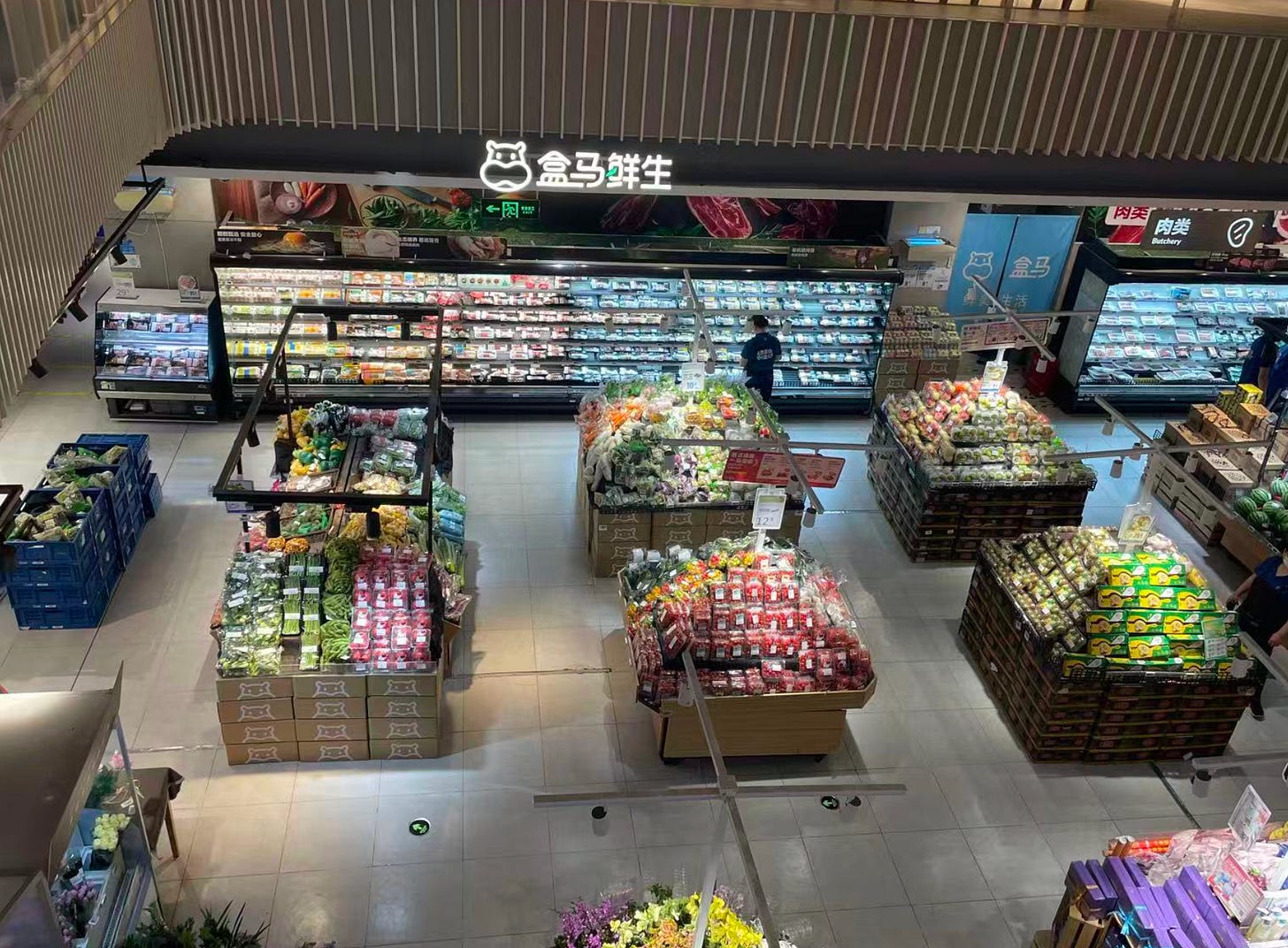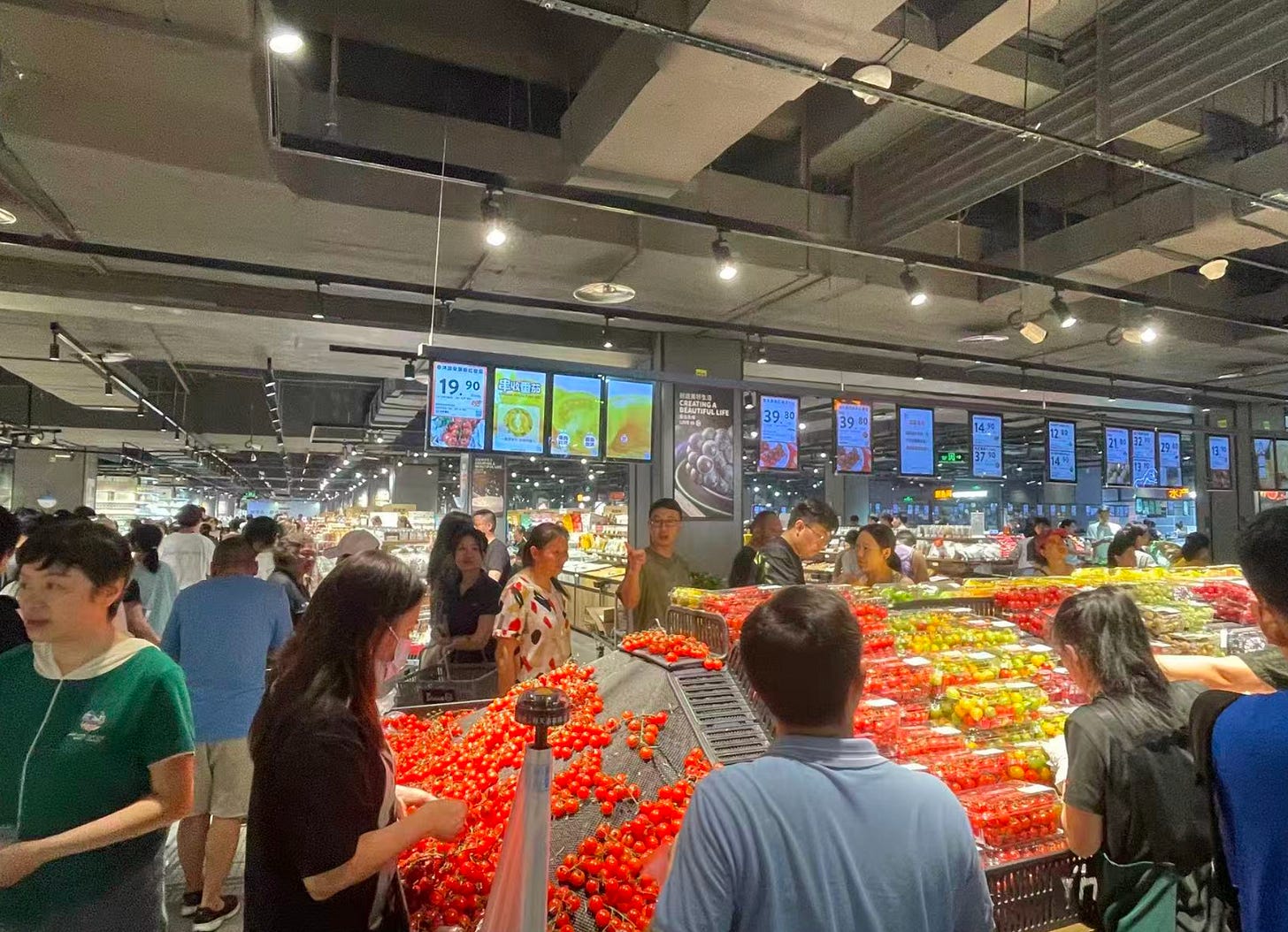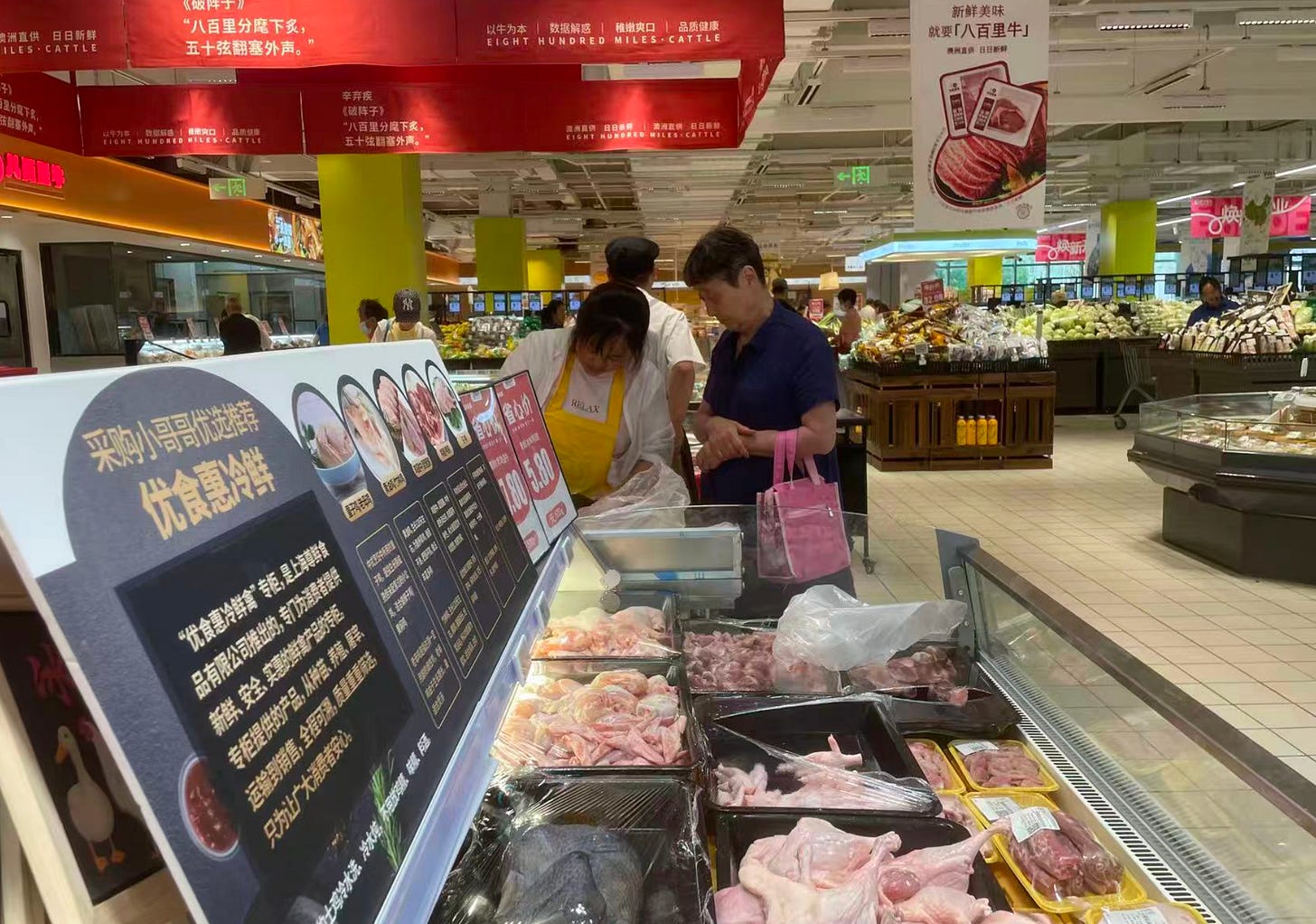A few things on my radar #22
Grocery Wars >> HEMA, Happy Monkey, Yonghui, Lianhua and RT-Mart.
👏🙋Hello, hello! Thanks for reading The Momentum — an independent publication without ads or affiliate links. Feel free to subscribe to receive new posts and support my work!
Since recovering from gallbladder issues, I've become extremely conscious of my diet and calorie intake. This naturally sparked my interest in the grocery business — as it directly affects my daily food sources.
From my observations, China's domestic grocery chains are rapidly evolving. They're moving away from traditional large supermarkets model plagued by complex distribution channels with multiple middlemen and disorganized product management. Instead, they're entering a quality-focused era featuring streamlined store operations, emphasis on fresh and safe ingredients, higher overall quality, and supply chain control that enables more reasonable pricing.
Clearly, Walmart, Costco, Aldi, and the legendary regional enterprise PDL deserve credit for this transformation. Their presence has forced the previously stagnant domestic retail industry to reinvent itself 👇
HEMA (Freshippo) 🦛🦛🦛
HEMA NB renamed to “Super Deal (超盒算) NB”, while warehouse-style stores shutdown
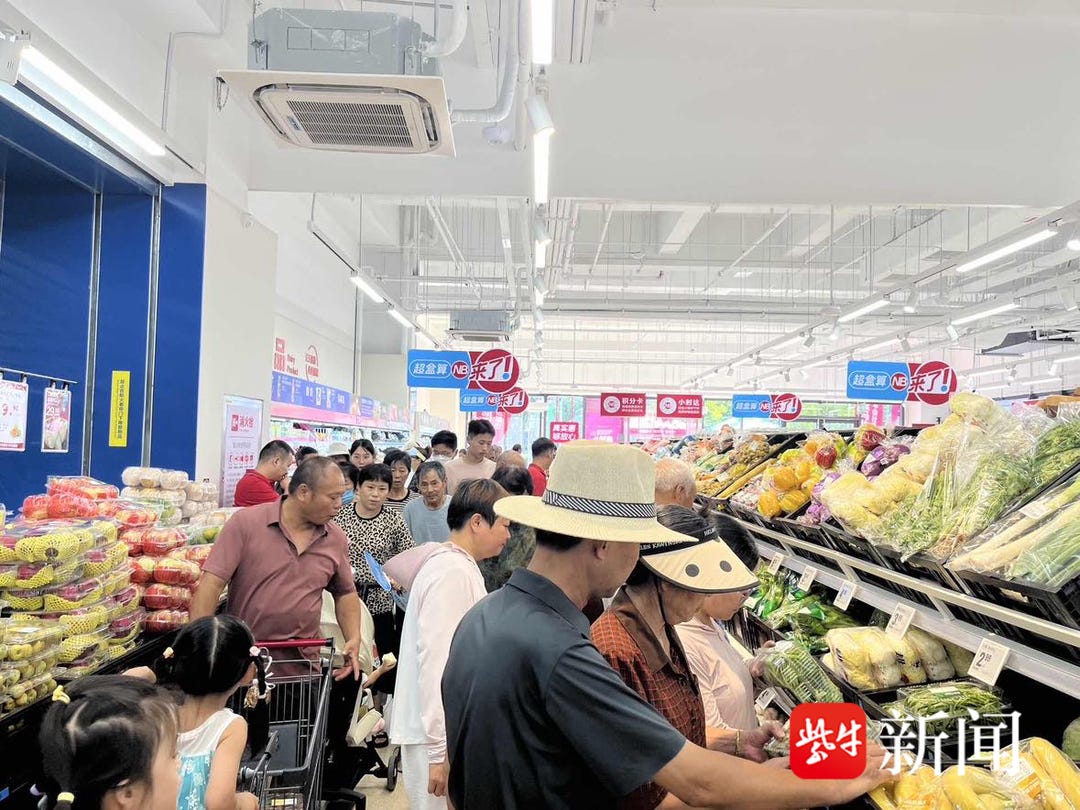
Alibaba's Freshippo is closing its warehouse-style X Member stores, ending its Costco / Sam's Club copycat strategy. This shows challenges for Chinese retailers with U.S. membership models requiring robust supply chains and loyal customers. Analysts cite cultural barriers: Chinese consumers resist membership fees and prefer shopping locally.
On August 29, Hema NB — the budget-friendly version of Hema Fresh — was officially renamed "Super Deal NB" to reinforce its position as an affordable community grocery brand, according to a report by 36Kr.
HEMA NB's H1 2025 turnover reached RMB 8 billion with double-digit YOY growth. Store count doubled to nearly 300 in six months, mainly in East China's urban areas. From April 2024 to March 2025, HEMA's GMV exceeded RMB 75 billion, achieving positive adjusted EBITA for the first time in a full year.
HEMA currently has two main store types: HEMA Fresh and HEMA (Super Deal) NB.
HEMA Fresh combines elements of Aldi (China version) and PDL, targeting white-collar workers with busy lifestyles. It offers high-quality, conveniently packaged ingredients while providing on-site processing of fresh items—including BBQ, fried rice, prepared foods, and seafood. Essentially, it's a restaurant-supermarket hybrid that leverages dining experiences to drive retail sales 👇.
HEMA NB is a community supermarket — focusing on low prices — the quality cannot compare with Freshippo Fresh, but it is indeed inexpensive. Moreover, these stores are located in remote areas, beneath residential buildings that mainstream commercial districts don't reach, making them popular among ordinary people and the elderly.
The renaming of HEMA NB, on one hand, is certainly aimed at making the positioning of the two store types clearer to avoid consumer confusion. On the other hand, it indicates that HEMA NB's performance must be quite good, qualifying it to become a separate sub-brand.
Happy Moneky 🐒🐒🐒
Meituan launches offline supermarket Happy Monkey to compete with HEMA
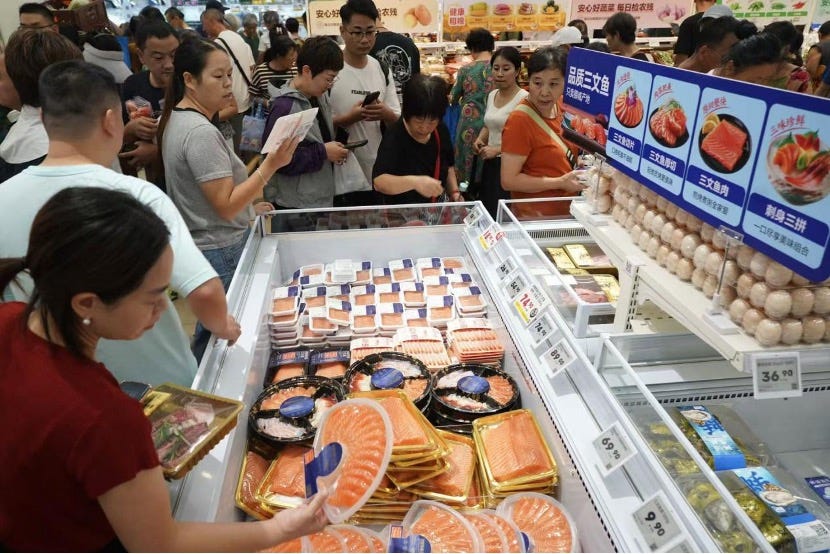
Meituan launched its "Happy Monkey" discount supermarket in Hangzhou on August 29th, offering just over 1,000 carefully selected products targeting essential local neighborhoods needs.
The company plans to open 1,000 stores eventually, with 2025 focused on optimizing the business model.
A Happy Monkey spokesperson explained: "Each product undergoes multiple layers of selection and strict quality inspection, ensuring products are fresh, safe, and offer excellent value through our scientific quality control system and proprietary supply chain."
Clearly, this business is positioned to compete with HEMA — — particularly their neighborhood business. Though I haven't visited yet, based on the images, it appears to emphasize quality more than HEMA NB.
Meituan's other grocery card is Little Elephant Supermarket — it's Meituan's front-of-store warehouse operation where users order online and pick up offline — it appears their offline large store model might be launching soon.
Meituan's other grocery card is "Little Elephant Supermarket 小象超市"— it's Meituan's front warehouse business where users order online and pick up offline — well, it is reported that their physical large store model will likely be implemented soon to compete with HEMA.
Yonghui (永辉超市) 🩸🩸🩸
Yonghui continues to learn from PDL, but still struggles with store closures and ongoing losses
Yonghui's 2025 H1 report: Revenue fell to RMB 29.95 billion (-20.73% YoY), while net profit plunged to RMB -241 million (-187.64% YoY) compared to last year's RMB 275 million yuan profit.
Revenue declined due to 2024's strategic transformation closing loss-making stores. Despite post-restructuring stores showing significant growth, couldn't offset the revenue gap from closures.
Net profit loss due to (1) Sales volume declined; (2) Supply chain reforms with supplier / product upgrades caused short-term gross profit decline (3) Closure of 227 unprofitable stores incurred lease compensation, inventory clearance, and asset write-off costs; (4) Advantage Solutions stock fair value change resulted in 184M yuan loss.
Personally, I'm actually optimistic about Yonghui — I've visited Yonghui in different cities like Chengdu, Chongqing, Wuhan, Nanjing, and Guiyang, and business is good everywhere, some stores are even packed, performing way better than their traditional model.
The current losses appear to be growing pains during the reform period — after all, the proportion of adjusted stores is still quite low, not enough to impact the overall performance.
Lianhua (联华超市) 😏😏😏
Lianhua Supermarket's self-revolution shows initial results
Shanghai Lianhua Supermarket announced last year plans to renovate over 20 Century Lianhua stores by year-end, using the Zhonghuan store as a model. Through streamlining SKUs, increasing private label product ratios, and direct sourcing to reduce costs, they have already achieved significant results.
Lianhua indicates an expected net profit of RMB25.0 million to RMB 55.0 million for the first half of 2025, a significant turnaround from a net loss of RMB 54.809 million in the same period of 2024.
Lianhua has surprised me when I shopped there — they've clearly been inspired by PDL as well as Yonghui.
RT-Mart (大润发) 📈📈📈
Just after being sold by Alibaba, RT-Mart successfully turned losses into profits
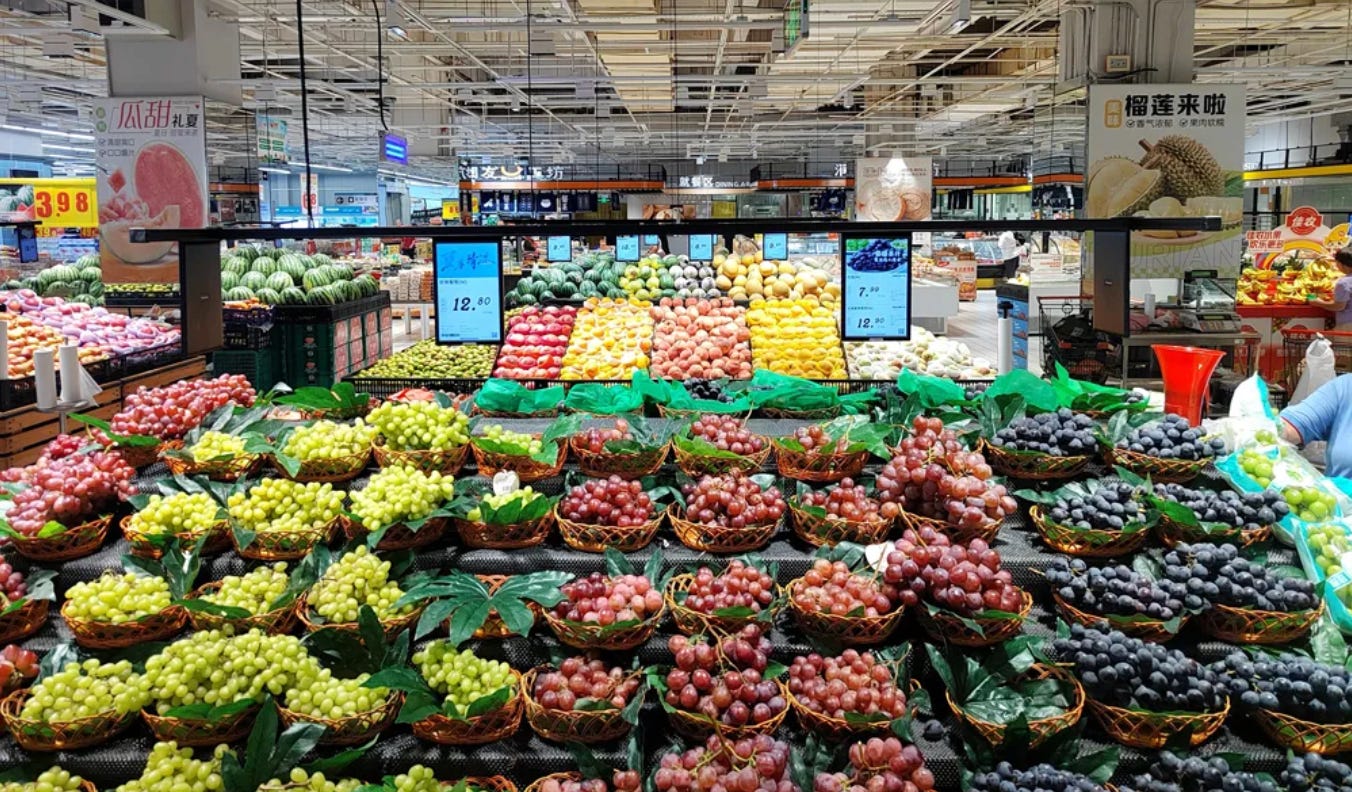
In fiscal year 2024, RT-Mart's parent company Sun Art Retail (HK6808) reported a loss of 1.668 billion yuan, compared to a profit of RMB78 million in fiscal year 2023 – a staggering decline of over 1000%.
In January, Alibaba sold its stake in Sun Art Retail (RT-Mart's operator) to DCP Capital for HKD13.1 billion (USD1.6 billion) – about 25% of its original investment. This divestment follows Alibaba's strategy to shed non-core assets and focus on its main business.
Sun Art Retail's fiscal year 2025 results show revenue of RMB 71.55 billion with 386 million net profit, successfully turning previous losses into gains. Their network now spans 505 stores across 207 cities.
Interesting — from the rapid turnaround of Lianhua and RT-Mart, two seemingly "outdated" companies, we can see that supermarket transformation isn't as difficult as imagined. This is especially true since PDL already serves as a local demonstration case, providing a methodology that can be followed.
Yet why has Yonghui's transformation been so tortuous (with no positive signs in current financial reports), while RT-Mart was nearly dead before being sold?
The answer likely lies in the complex web of supply chain relationships and hidden grey interests within the industry.
Corruption may have infested procurement processes in various forms and requires time to eliminate. Reform faces strong resistance unless led by someone who intimately understands internal dynamics and commands respect.
Take Ye Guofu (叶国富) for example—though he is the founder of MINISO (Yonghui's current largest shareholder) with clear transformation goals, he still hasn't found a suitable CEO for Yonghui. This leadership vacuum shows Ye Guofu lacks sufficient talent support during the reform process — explaining why Yonghui's reform must proceed gradually, taking careful steps rather than making bold leaps.
In contrast, transformation happens much more efficiently when leaders are cultivated internally—as seen with Sun Art's new CEO coming from the original system, HEMA's CEO emerging through internal competition, or Lianhua's new CEO also being developed from within the company.



